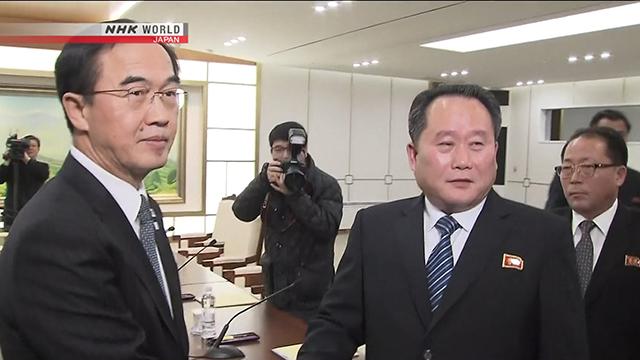South Korea's chief delegate hailed the meeting as significant. Unification Minister Cho Myoung-gyon said, "We have agreed that we should respect each other and improve South and North Korea's relationship. This meeting is the first step toward solving problems between us."
The talks follow months of heightened tensions because of Pyongyang's continued development of its nuclear and missile programs. The North's delegation made it clear that disarmament talks are not on the table.
North Korean delegation chief Ri Son Gwon said, "Regarding the nuclear issues, our strategic weapons including atomic bombs, hydrogen bombs, and intercontinental ballistic missiles are only aimed at the United States, not our brethren."
Some analysts say improving ties between the Koreas could drive a wedge between the South and the United States.
Moon pushes for peace
In his New Year address, South Korea's President Moon Jae-in said he wants more talks with North Korea to resolve the country's nuclear issue and establish peace.
His comments came one day after a diplomatic breakthrough between the countries. "The denuclearization of the Korean peninsula the 2 Koreas agreed upon jointly is our basic stance that will never be given up," he said.
Moon said the upcoming PyeongChang Olympic Games should be a turning point for bringing peace. He also gave US President Donald Trump a great deal of credit for helping establish discussions.
Last week, Trump tweeted the inter-Korean talks would not be going on if he wasn't firm, strong and willing to commit his country's total might against the North.
The world welcomes the talks
Japanese Chief Cabinet Secretary Yoshihide Suga welcomed the North's decision. He said, "The Olympics and Paralympics are festivals of peace, so the North's change in stance with regard to the PyeongChang Olympics should be taken positively."
Suga added Tokyo remains committed to pressuring Pyongyang in various ways to halt its nuclear and missile development. Tokyo will keep cooperating with the US and South Korea.
The US was also pleased with the move. White House Press Secretary Sarah Sanders called the North Korean participation "an opportunity for the regime to see the value of ending its international isolation by denuclearizing."
She added that denuclearization of the Korean Peninsula is the US government's number one priority and what it would like to see as the next step.
US State Department spokesperson Heather Nauert said the United States welcomes the inter-Korean meeting aimed at ensuring a safe, secure, and successful Winter Olympics.
But she also said the US and South Korean presidents agreed to continue the campaign of maximum pressure on North Korea toward the goal of complete and verifiable denuclearization of the Korean Peninsula.
UN Secretary-General Antonio Guterres also applauded the inter-Korean agreement to hold military-to-military talks and reopen the military hotline. He said the re-establishment of such channels would be critical to lowering the risk of miscalculation or misunderstanding.
The UN chief also welcomed North's decision to send a delegation to the Olympics, saying the holding of the Games can foster an atmosphere of peace, tolerance and understanding among nations. He also said he hopes such engagement and efforts will contribute to the resumption of sincere dialogue leading to sustainable peace and denuclearization on the Korean Peninsula.
China's Foreign Ministry spokesperson, Lu Kang, said the country is pleased by the high-level talks. Lu said China hopes the talks will be a starting point for the 2 Koreas to mend ties, reach reconciliation, and step up cooperation.
Russian presidential spokesperson Dmitry Peskov also welcomed the talks. He told local media that contact is the only way to ease tensions on the Korean Peninsula, and it's exactly what the Russian leader has been calling for.
Moscow has been seeking a political approach instead of putting pressure on Pyongyang.
